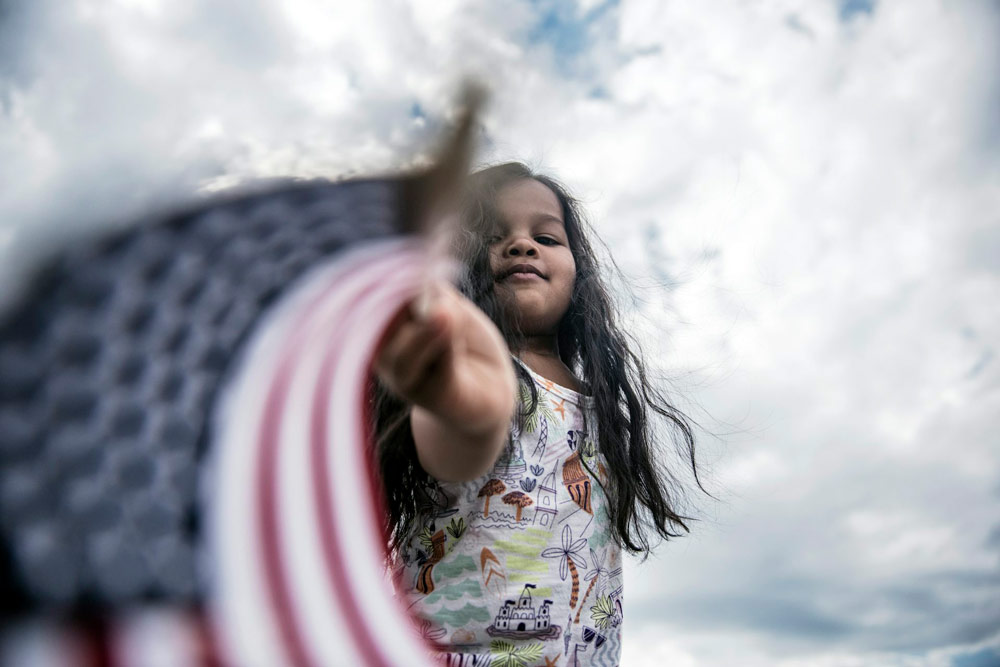Written by Katherine Kinzler
Nationality is often defined by a set of legal criteria in the United States and other countries. This could have to do with naturalization processes, parental citizenship, or place of birth.
However, as social and developmental psychologists like myself have shown, these objective ideas of citizenship are somewhat hazy in the minds of many Americans. Based on psychological characteristics like color, ethnicity, or language, some people may just appear slightly more American than others.
This leads to varying opinions on who is accepted, who is tolerated, and who is made to feel completely excluded, all of which are reinforced by identity politics.
How race affects who belongs
Many people who openly support egalitarian principles—such as the idea that all Americans, regardless of color, should have the right to citizenship—still covertly hold preconceived notions about who is truly American.
According to a seminal 2005 study, American adults of all races were most likely to connect the term “American” with white people. Adult Asian American, Black, and White respondents were asked if they supported equality for all citizens. After that, they were given an implicit association test in which they had to match various faces to either the American or foreign category. Every face was a U.S. citizen, they were told.
Even when they initially stated egalitarian beliefs, white and Asian participants matched the white faces with American ones the fastest. Black Americans implicitly perceived Asian looks as less American, but they also implicitly perceived Black and white faces as equally American.
Similarly, despite knowing their true nationalities, a number of American adult groups in a 2010 survey implicitly believed that British actress Kate Winslet was more American than Lucy Liu, who was born in the United States.
Crucially, sentiments that are detrimental to one’s own group can also be a part of the formation of prejudice. Asian Americans who participated in the study reported that white faces were more American than Asian ones, demonstrating this. Hispanic individuals were also more inclined to identify whiteness with Americanness, according to a related 2010 study.
Language and nationality
As I demonstrate in my book How You Say It, these prejudiced perceptions of nationality start early in life, and spoken language is frequently the main means of determining who belongs to which group.
Despite the fact that the United States has never had a national language, many Americans believe that speaking English is essential to being a true American. Additionally, the president declared English to be the official language in a recent executive decree.
In a 2017 study headed by psychologist Jasmine DeJesus and carried out by my research team, we assigned kids the following easy task: Children were asked to determine their nationality after seeing a sequence of faces with different skin tones and hearing those persons talk. They spoke Korean or English and had either Asian or Caucasian faces. We inquired, “Is this person Korean or American?”
For the study, we selected three groups of children: Korean American children who spoke both languages, white American children who spoke exclusively English, and South Korean children who spoke only Korean. The children were either 9–10 years old or 5–6 years old.
Despite the fact that both groups were equally split between people who appeared white and Asian, the great majority of the younger monolingual children associated language with nationality, characterizing Korean speakers as Korean and English speakers as Americans.
The parents of the younger multilingual children resided in the United States and spoke Korean, not English, as their first language. However, they believed that English speakers—rather than Korean speakers—were Americans, just like the monolingual kids.
However, as they get older, kids see race as an essential component of nationality more and more. By the age of nine, we discovered that children viewed white English speakers as the most American, in contrast to English speakers who appeared Asian or Korean speakers who appeared white.
It’s interesting to note that the older kids we recruited in South Korea experienced this effect more strongly.
Deep roots
Therefore, it appears that opinions about what it means to be American, held by both adults and children, are based on characteristics that are unrelated to the actual legal requirements for citizenship. Being white and speaking English well are not prerequisites for being an American.
And there are repercussions for this partiality.According to research, people’s discriminating employment practices and suspicions about the loyalty of others are correlated with how much they associate being white with being American.
The fact that we observe these biases in kids does not imply that they are unavoidable. These kinds of biased cultural cues and beliefs are known to be ingrained in children from an early age. However, it does imply that these prejudices are deeply ingrained in our psyche.
It could be simpler to address biases if one is aware of their existence. Thus, those who celebrate the Fourth of July would want to consider what it means to be an American and whether social prejudices skew one’s sense of belonging.
![]()
At the University of Chicago, Katherine Kinzler teaches psychology.







